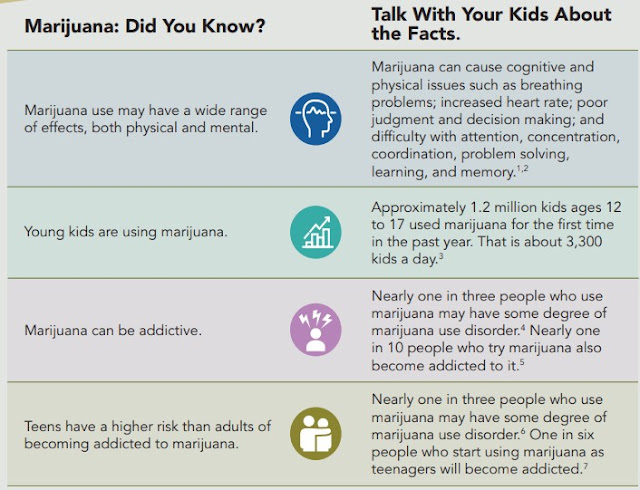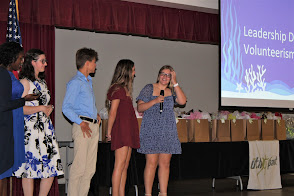April 20 (4/20) is a day some Americans associate with a drug that is illegal in many states: Marijuana.
The origin of 4/20 is still a mystery. Some say it came out of a ritual begun by a group of high school students in the 1970s who met every day at 4:20pm to smoke marijuana. Others believe 420 was the California police code for marijuana. Another theory is there are 420 active chemicals in marijuana; in reality, there are more than 500 chemicals.
No matter the legends, Marijuana use comes with real risks that impact a person's health. People can and do become addicted.
* 1 in 10 of those who use marijuana will become addicted.
* When youth start using before age 18, the rate of addiction rises to 1 in 6.
Marijuana has become the most commonly-used illegal substance in the United States. Many young people do not consider its use to be a risky behavior. This is especially concerning because the teen brain is still developing into the mid-20's and today's marijuana is stronger than ever.
One of the major goals of
substance abuse prevention programs is to delay the age of onset of substance
use – the earlier you start talking to children about the risks of using
alcohol and other drugs, the better. Parents often ask what the right
age is to begin talking to kids about the gateway drugs of alcohol, tobacco,
and marijuana. Discussion should begin around age 10 with straightforward,
age-appropriate information and remain ongoing through the teen and young adult
years. It need not be formal – it is best to look for teachable moments. Stick
to the facts and take time to listen. Let kids ask questions to find out what
they already know or what they have seen or heard from friends and classmates.
Chances are they may have a lot of misinformation.
Here are some good points for discussion:
What is Marijuana? – Marijuana is made of the dried
leaves, flowers, stems, and seeds of the cannabis plant. It contains
cannabinoids including the mind-altering chemical delta-9-tetrahydrocannabinol
(THC), a chemical that causes the “high” experienced by users.
Is Marijuana a drug? – Yes, the THC in marijuana is a
mind-altering chemical that affects learning, memory, and reaction time.
Continued use can lead to paranoia, anxiety, vomiting, and psychosis with
delusions and hallucinations. Prolonged use is especially dangerous for young
people because it affects the brain, which is still developing into a person’s
mid-twenties. Use at an early age can lead to addiction and use of harder
drugs.
What are some other names for Marijuana? – Common
nicknames for marijuana include pot, weed, grass, reefer, and Mary Jane. Many
describe using marijuana as “getting high,” “getting baked,” or “getting
stoned.”
Why do people use Marijuana? People use marijuana for
reasons such as for fun, a new experience, to relax or cope with overwhelming
emotions. Teens may be influenced by peers and feel they have to use marijuana
to fit in. Others use marijuana to treat medical conditions, often without
guidance from a medical professional.
How is Marijuana used? – Most marijuana is smoked in
hand-rolled cigarettes (joints), in pipes or water pipes (bongs), as well as in
blunts filled with a mixture of marijuana and tobacco. Vaping is another way
where marijuana is inhaled as a vapor through an e-cigarette or a vaping pen.
Marijuana can also be baked into foods like cookies, brownies, candy, and even
in drinks that may contain THC. Edibles can be extremely dangerous for children
since it is hard to tell the difference between regular food and marijuana
edibles or gauge how much THC is contained in the product.
What are the risks of using Marijuana? – Teens and
young adults are most at-risk of the harms of marijuana. Addiction and
substance use disorders are 4 to 7 times more common in those who begin use
before age 18. Marijuana can cause impaired attention and memory problems that
may adversely affect academic learning in school and athletic performance in
sports. Brain development can also be negatively impacted, including
decision-making and impulse control. Side effects of regular marijuana use may include
anxiety, paranoia, psychiatric disorders, learning/memory problems, slower
reaction time, increased appetite, stomach pain, nausea, and vomiting.
What Percentage of 6-12 grade students in Polk County DO
NOT use Marijuana? – Good news is that most Polk students choose to be
Healthy! UthMpact Facts show that 88% DO NOT use Marijuana and 90% DO
NOT Vape, according to statistics collected among Polk County students and
published in the annual Florida Youth Substance Abuse Survey (FYSAS). Knowing
the truth can help kids avoid succumbing to peer pressure because they feel
confident in making more informed personal decisions after knowing and
considering all the facts.
How can Parents help? - Parents can be a continual
source of information and support. Let the young people in your life know you
are available whenever they want to talk. It is important not to lecture –
listen to their perceptions about marijuana; be clear about your position; let
them know this is a health concern.
Timely information and talking points can be found in the
Marijuana Resource Center on the Partnership to End Addiction website at: https://drugfree.org/marijuana-resource-center/

































